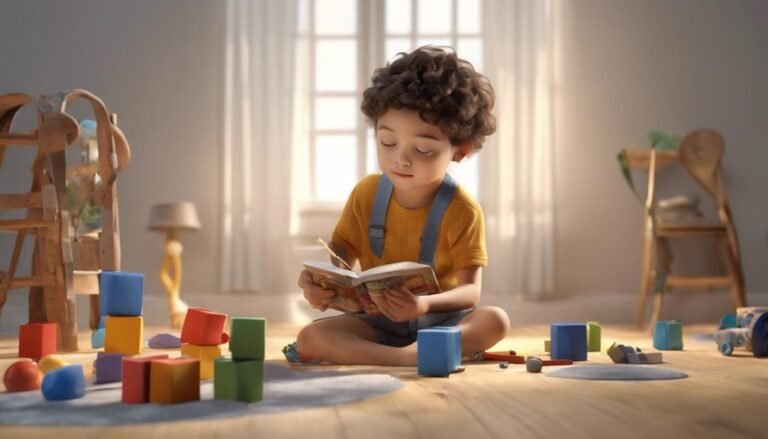Cultural Influences on Personality Development
Imagine personality development as a tapestry woven from threads of cultural influences, each strand contributing to the intricate design of who you are. Just as a tapestry tells a story through its patterns and colors, your personality reflects the unique blend of beliefs, values, and traditions that have shaped you. But how does this diverse cultural mosaic impact your sense of self and interactions with others? Understanding these influences can reveal a deeper understanding of your identity and relationships, prompting you to explore the fascinating interplay between culture and personality development.
Key Takeaways
- Cultural norms shape acceptable behaviors and values.
- Family dynamics influence beliefs and values.
- Social norms and peer pressure impact attitudes.
- Language and communication styles affect personality development.
- Cultural identity forms through self-discovery and external influences.
Cultural Beliefs and Values
Understanding how cultural beliefs and values shape personality development is essential for gaining insight into the intricate interplay between societal norms and individual identity formation.
Cultural norms act as guidelines that dictate acceptable behaviors within a specific society, influencing how individuals perceive themselves and interact with others. These norms vary widely across different cultures, encompassing everything from communication styles to concepts of personal space.
Moreover, value systems play an important role in shaping personality development by instilling moral principles and guiding decision-making processes. Cultural values such as collectivism versus individualism, hierarchy, and attitudes towards time can greatly impact an individual's sense of self and their relationships with others.
For example, in cultures that prioritize collectivism, individuals may place a higher value on harmonious group dynamics and interdependence, whereas in individualistic cultures, personal achievements and autonomy are often more emphasized.
Family Dynamics and Influence
Family dynamics greatly shape individual personality development by serving as a crucial source of socialization and influence. They impact how you perceive yourself and interact with the world around you. Parental guidance plays an essential role in shaping your beliefs, values, and behaviors. Sibling rivalry can influence your competitiveness, cooperation, and conflict resolution skills.
The dynamics within an extended family can also profoundly impact your personality development. Interactions with relatives of different ages and backgrounds can expose you to diverse perspectives and values. Generational differences within families can lead to varying expectations, communication styles, and approaches to life, shaping your personality in unique ways.
Nurturing healthy family dynamics that foster open communication, respect for individual differences, and support can contribute positively to your overall personality development. By recognizing the influence of family dynamics on your personality, you can better understand yourself and navigate your interactions with others in the world.
Social Norms and Expectations
Social norms and expectations within a society greatly shape your behavior, attitudes, and personality development. Peer pressure and societal standards play a significant role in influencing your actions and decisions.
The desire to conform to group dynamics and societal pressures can lead you to adopt certain behaviors or beliefs, even if they may not align with your true self. Whether it's conforming to fashion trends, adhering to cultural traditions, or following unwritten rules of conduct, societal norms can exert a powerful influence on your sense of identity and self-expression.
The pressure to meet societal expectations can often create internal conflicts as you navigate between fitting in and staying true to your individuality. Striking a balance between honoring societal norms and embracing your unique traits can be a challenging yet essential part of personal growth.
Language and Communication Styles
Moving through different language and communication styles can greatly impact how you express yourself and interact with others, shaping your personality development in diverse ways. The use of language goes beyond just words; it includes nonverbal cues and the cultural context in which communication occurs.
Nonverbal cues, such as body language and facial expressions, play a significant role in conveying meaning and emotions, influencing how others perceive you and how you understand them.
A bilingual upbringing can also shape your communication style and personality. Growing up with multiple languages can lead to a unique blend of linguistic expressions and cultural influences. This exposure can impact identity formation, as individuals navigate between different linguistic worlds, adapting their communication styles to fit varying contexts.
Embracing and understanding these diverse communication styles can enhance interpersonal relationships and foster a deeper appreciation for cultural differences. By embracing the nuances of language and communication, you can enrich your personality development and broaden your worldview.
Cultural Identity Formation
Exploring the intricate interplay between cultural heritage and personal experiences, your cultural identity forms through a dynamic process of self-discovery and external influences.
Cultural identity formation involves moving through various stages, including identity crisis and cultural assimilation. During these phases, you may find yourself questioning your beliefs, values, and traditions, leading to a deeper understanding of who you're within the context of your culture.
Peer influence plays a significant role in shaping your cultural identity. Interactions with friends, classmates, and community members expose you to different perspectives and ways of life, prompting reflection on your own cultural background. This external influence can either strengthen your sense of cultural belonging or ignite a desire for self-acceptance and exploration.
Self-acceptance is an essential component of cultural identity formation. Embracing your cultural heritage while also being open to new ideas and experiences allows for a more nuanced understanding of yourself and others. By actively engaging in this process, you can cultivate a strong sense of identity that's both rooted in tradition and adaptive to change.
Intergenerational Transmission of Traits
As you explore the intergenerational transmission of traits, consider the significant impact of family legacy on shaping personality characteristics.
Ancestral behavior patterns passed down through generations can play a pivotal role in influencing individual traits and behaviors.
Understanding how these cultural legacies intertwine with personal development offers a holistic view of the complex web of influences that shape who we are.
Family Legacy Impact
To comprehend the impact of family legacy on personality development, one must explore the intricate web of intergenerational transmission of traits. Generational traditions and inherited traits play a significant role in shaping one's personality. Family heritage holds a wealth of knowledge, values, and experiences that are passed down through generations, influencing individual growth and development.
Within families, certain behaviors, beliefs, and ways of interacting become ingrained over time, creating a unique family culture. This family culture, rooted in generational traditions, serves as a blueprint for how individuals navigate the world and form their identities. Whether it's the importance placed on education, the value of hard work, or specific religious practices, these inherited traits shape how individuals perceive themselves and others.
As individuals grow within the context of their family legacy, they absorb not only the explicit teachings but also the subtle nuances of behavior and communication patterns. These elements of family heritage can deeply influence personality development, shaping values, attitudes, and interpersonal relationships in profound ways.
Ancestral Behavior Patterns
Inherited ancestral behavior patterns play a pivotal role in shaping your personality development through the intergenerational transmission of traits. Genetic predispositions passed down from your ancestors can influence various aspects of your behavior, such as temperament and tendencies towards certain behaviors. These predispositions, combined with societal influences, create a complex interplay that molds your personality.
Evolutionary psychology suggests that certain behavioral traits may have been advantageous for survival in ancestral environments, leading to their persistence in modern individuals. For example, a predisposition towards cautious behavior could have been beneficial in early human societies, where threats were more immediate.
Cultural traditions also play a significant role in the transmission of ancestral behavior patterns. Practices and beliefs passed down through generations can shape your worldview and influence how you interact with others.
Impact of Globalization on Culture
Globalization has greatly influenced cultural norms, values, and practices around the world, shaping the way individuals perceive themselves and interact with others. The effects of globalization on culture are profound, leading to increased cross-cultural exchange and interconnectedness.
Through the integration of different cultural elements, individuals are exposed to diverse perspectives, traditions, and ways of life. This exposure fosters a greater appreciation for cultural diversity and promotes understanding across borders.
Globalization hasn't only facilitated the exchange of goods and services but also ideas, beliefs, and customs. As a result, individuals are more likely to adapt and incorporate aspects of different cultures into their own lives. This blending of cultures has led to the emergence of hybrid identities, where individuals draw from various cultural influences to shape their sense of self.
In today's globalized world, cultural boundaries are becoming increasingly blurred as people engage in multicultural experiences and interactions. This dynamic cultural landscape challenges traditional notions of identity and encourages individuals to embrace diversity in all its forms.
Conclusion
As you reflect on the intertwined nature of cultural influences on personality development, remember that each belief, value, and social norm shapes who you are.
Embrace the richness of your cultural identity, honoring the past while embracing the future.
Let the tapestry of diverse influences guide you on your journey of self-discovery.
Embrace the beauty of cultural diversity, for it's in understanding and celebrating differences that we truly grow and evolve as individuals.






